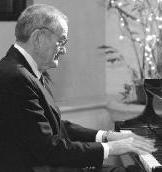"I
can't think of anybody who's better than Ralph Sutton." Bing Crosby
"He's
a complete musician - even plays Chopin, Brahms, and Bach beautifully."
Teddy Wilson
"He's probably the strongest two-handed pianist I've ever heard."
Yank Lawson
"He always plays the right things behind me, and he's just sensational
as a soloist." Peanuts Hucko

The pianist Ralph Sutton has died at the age of 79 in Denver.
Influenced at the age of 9 by Fats Waller, Ralph went on to become a master of stride piano. He went on to play with some of the greatest jazz musicians in the world and made more than 40 recordings on many labels.
He was regarded by many as being one of the few jazz pianists who had complete mastery of his instrument. Audiences were eager to hear his brilliant impressions of other stride pianists of the caliber of his idol Fats Waller, James P. Johnson and Willie ‘The Lion’ Smith. According to the clarinet player Kenny Davern, people would be jumping up out of their seats when Ralph got going on something like Honky-Tonk Train Blues.
Born in Hamburg, Mo., on Nov. 4, 1922, he was raised in the nearby town of Howell, later destroyed when the government chose the location to build a dynamite factory. As a boy, he first played the organ in the local Presbyterian church, then his father, a construction worker who played the fiddle in his spare time, let him play piano in his country band.
When Ralph was 19, and still attending university, trombonist Jack Teagarden came through town in 1941, and hearing Ralph play immediately invited him to join his band in New York. Shortly after joining, however he was drafted into the Army, where he spent a great deal of his time playing glockenspiel in an army band in the Mojave Desert.
Upon discharge he rejoined Teagarden's band at the Famous Door on 52nd Street in New York. Later, in 1948, he began working as intermission pianist at Eddie Condon's jazz club on West Third Street—a job that lasted for the next eight years.
At that time American musicians were rarely able to play in Britain,
but Sutton made his first visit to London in 1952 by appearing as a variety
turn. His arrival on the stage of the Royal Festival Hall, resplendent
in white tie and tails, caused quite a stir, but the visit established
his life-long popularity among British jazz lovers.
Then he came under the attention of jazz-loving millionaire, Dick Gibson, who assembled a permanent band in 1968, called The World's Greatest Jazz Band, with Peanuts Hucko, Bob Haggart and Yank Lawson, using Ralph as its pianist. It was a superb ensemble that travelled the world with great success until the late 1970s. Ralph left the band in 1974 and went to live in Colorado, from whence he embarked on a regular series of solo tours. By 1980 his status as an international jazz figure was established, and he had become an inspiration to the new generation of young musicians dedicated to the live performance of classic jazz .
His travels took him regularly to Europe, Australia and Japan; in later years he made a number of superb recordings, including a series for the Chazz Jazz label, with Ruby Braff and Vic Dickenson, a duet album with fellow-pianist Jay McShann, titled The Last Of The Whorehouse Piano Players and two solo recitals, Eye Opener (1990) and Maybeck Recital (1993). Ralph's last British appearance was at the Brecon Jazz Festival in 1999.